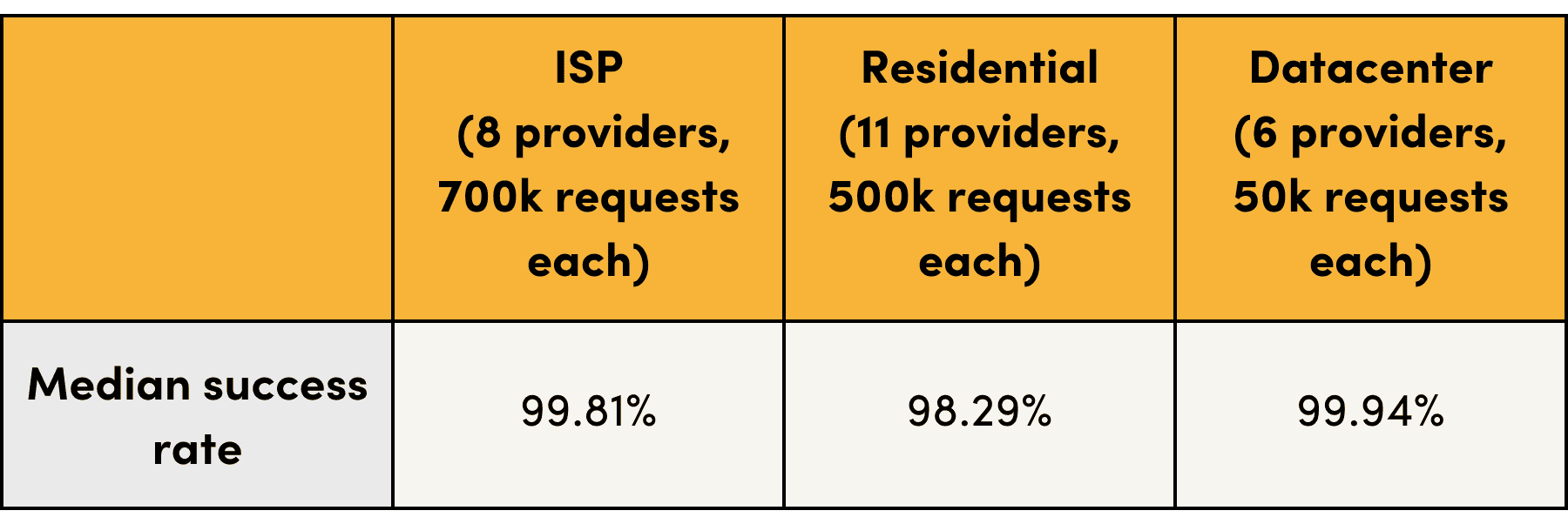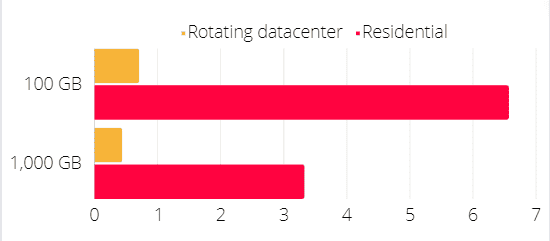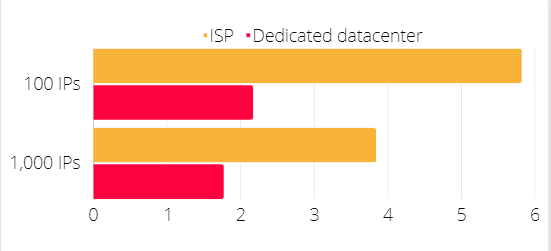How Do ISP Proxy Servers Compare to Other Types: A Comprehensive Guide
ISP proxies are all the rage these days. They’re highly anonymous and predictable, so these IP addresses are a go-to choice for managing multiple accounts on well-protected platforms.
A while ago, few providers offered ISP addresses, but today, that isn’t the case anymore – most companies added ISP proxies to their line-up. So, let’s see how ISP proxies compare to other types of proxy servers.

A primer on different proxy servers
A proxy server acts as an intermediary between your device and the internet. When using a proxy, it forwards all your connection requests passing through. While doing so, it hides your device’s IP and location, showing the server’s information instead.
Let’s have a look at the main proxy server types.
ISP proxies – ideal for websites that require consistent identity
ISP proxies, or static residential proxies, are intermediary IPs associated with internet service providers (ISPs). They're hosted on a server rather than a residential device like a desktop computer or mobile phone.
In the past, ISP proxies were all datacenter IPs hosted on servers of cloud hosting companies such as Amazon AWS. The proxy could stay online for up to one month, but they were easy to detect because such companies don't offer internet services to consumers.
Today, ISP proxies are relatively hard to detect. They're owned by internet service providers, which have a much better reputation than cloud hosting services. What's more, such proxies have high speed and uptime. They don't need to rely on end-user connections, so they are always available on-demand.
In terms of weaknesses, ISP proxies are very expensive and offer fewer locations than residential proxies.
Datacenter Proxies – fast and stable proxies for unprotected websites
Datacenter proxies, similar to ISP counterparts, are IPs held in servers of various cloud and web hosting companies like Amazon AWS and Digital Ocean.
Affordability is the main benefit of datacenter addresses. They’re the cheapest of all types of proxy servers because datacenter proxies are relatively simple to make – you only need to rent IPs and servers to host them on.
Additionally, these proxies are well-known for speed and stability. They make use of very fast internet connections. For example, you can easily find servers with 1Gbps or even 10Gbps speeds, so 100Mbps is considered slow for a datacenter proxy.
However, such proxies have many limitations. They typically have fewer locations, ranging from 3 to 30 countries in most cases. Additionally, websites can often identify and block datacenter IPs due to their non-residential ASN (identifying number).
Comparing ISP proxies to residential and datacenter IPs
In this section, let’s look at the ISP proxy pool size, performance, features, and pricing. We’ll also compare ISP addresses to residential and rotating datacenter proxies.
Proxy pool
Let’s look at how big the ISP proxy networks are, their composition, and how they compare to residential and datacenter proxies.
While datacenter and ISP proxy networks are typically smaller than their residential counterparts, it’s not a fair comparison. The key difference is that residential proxy connection comes and goes, as ISP and datacenter addresses are always online. The latter makes the advertised numbers more accurate.
On the other hand, Proxyway’s ISP proxy research showed that the networks can get really big. For example, some providers returned over 100,000 addresses in the US. And that’s more than enough IPs to work with.
Static residential IPs are rented from different ISPs, and the addresses often come in related ranges called subnets. In simple words, if one IP address gets blocked, all of them will. But ISP proxies have a large variety of subnets, though less compared to residential proxies.
To illustrate this, let’s see how ISP and residential proxies look in parallel. During Proxyway’s research, we tested a residential proxy network and found 82,000 unique residential IPs scattered through 17,000 different subnets. At the same time, the biggest number with ISP proxies was just over 550 subnets.
Features
Like datacenter proxies, ISP addresses cover a limited number of countries. For example, some providers offer only US-based locations, while others add major Western European countries. This is because static residential proxies are hosted on servers rather than consumer hardware; there are many challenges surrounding operations and cost, so renting multiple servers is an overkill.
Finding an ISP service that comes with city-level targeting is hard – even then, this feature often works only in the US. In other locations, you can get (very rarely!) the capital or, if you’re lucky, up to three other cities. On the other hand, peer-to-peer networks usually come with locations worldwide and have targeting options up to the zip code.
ISP and datacenter proxies are static by default, but most providers have rotating formats for web scraping purposes. On the contrary, residential addresses are rotating in nature, but you can hold sticky sessions for up to 24 hrs!
SOCKS5 – the internet protocol that allows one device to send data to another via a third device – is another feature that comes with ISP proxies. But that isn’t always the case with residential and datacenter addresses. Before, some providers refrained from offering this feature because of security concerns. Now, many residential and datacenter proxy providers offer SOCKS5 support, but there are still services without the feature.
Infrastructure performance
To evaluate the performance of ISP proxies, Proxyway measured their success rate, response time, and download speed.
Looking at the median success rate, ISP and datacenter proxies have similar results. And even though residential addresses have improved over the years, they’re still less stable compared to their counterparts.

In terms of response time, ISP proxies are definitely the number one in the race. The median response during Proxyway’s tests was 0.68s, and they outpaced residential IPs by 35% and datacenter proxies by 25% in the US.

When testing ten random ISP proxies from each network, the median download speed of ISP addresses was 10.57MB/s. And even though the results depend on individual connection quality, these proxies are still fast.
Affordability
Let’s look at how providers structure ISP proxy pricing and compare the cost to datacenter and residential proxies.
One major downside of ISP proxies is the high price, largely because of their sourcing challenges. Also, most providers in the market don’t offer a Pay As You Go payment model for their ISP product. So, you’ll have to stick to subscription-based plans, which are pretty steep compared to datacenter and residential proxies.
You can buy ISP proxies two ways: pay for traffic or rent individual IPs. Traffic-based formats have a steep entry price, and a gigabyte costs several dollars more than residential proxies. For 100 GB of data, the average rate stands at $9.2. This is 25% higher than the pricing these providers offer for residential proxy services.
Average price per GB at two price points. Image by Author.

List-based pricing comes cheaper, and you can get proxies for as little as $0.20. However, they’re still 2-3 times the price of datacenter proxies.
Average price per IP at two price points. Image by Author.

Bottom line
Alright, let's break it down. ISP proxies combine the performance of datacenter addresses and the anonymity of residential proxies. So, they're a solid pick if you're after consistent identity and speed.
But, here's the catch – they can burn a hole in your pocket. ISP proxies are pricier than residential or datacenter proxy servers. Plus, you won’t get location variety.
So, if you've got the budget and want top-notch performance, ISP proxies are your go-to choice. But you might want to look elsewhere if you're on a tight budget or need a wider range of locations.
If you're interested in learning more, dive into the ISP proxies topic by exploring our guide on ISP proxies vs. residential proxies. Discover the best ISP proxy service providers on the market, and learn about the top SOAX alternatives.
The information provided here is valid as of 13-02-2024. Please be advised that circumstances and facts may change over time, rendering this information outdated or incomplete. Performance data is taken from Proxyway Market Research 2023.Proxyway Market Research 2023.




